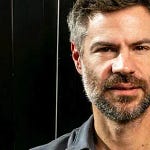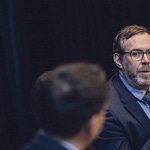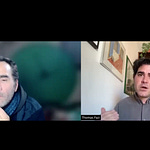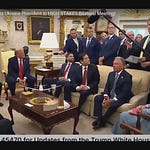You’ll find the transcript of the interview below. Only the podcast intro in French.
The refusal of European leaders to confront reality borders on psychosis. They fail to grasp that the world has shifted, that Europe is now merely peripheral, and that decisions will largely be shaped by the three major powers—the United States, China, and Russia—backed by the other BRICS members.
The Europeans’ proposals amount to little more than a rebranded NATO, especially their insistence on providing Ukraine with security guarantees—guarantees that have significantly contributed to the outbreak of the war. Lacking the necessary military and industrial strength to deliver, they are leaning heavily on the United States for support in this venture. However, this initiative is not only destined for failure but also threatens to ignite a third world war—a scenario the U.S. has prudently opted to avoid.
At the same time, a far more perilous and potentially deadlier crisis is emerging in the Middle East, fueled by the criminal conduct of the Israeli government.
We explore these issues with Pascal Lottaz, a professor of international relations at Kyoto University in Japan and the head of the Neutrality studies’ think tank, whose YouTube channel comes highly recommended.
L’Eclaireur :
Pascal Lottaz, thank you so much for taking time to speak with me again. I suggest that we start with the hot stuff. What's your take on what I call the Oval Office massacre where Trump and the Jedi bonds put Zelensky back at his place? Was it a trap set by the Trump administration, or is it a planned disengagement?
Pascal Lottaz :
There are several theories out there. My take is that since Mr. Trump and Mr. Vance were quite cordial and nice to Mr. Zelensky in the beginning, the dispute only started after more than half an hour of engagement. It started late and naturally, as the discussion heated up. Mr. Zelensky attacked an injection by Mr. Vance, which Vance didn’t let slide, and then Mr. Trump intervened.
I don’t think it was planned in the sense that Trump and Vance set out to corner him. But it was clear from the American side that they wanted their viewpoint—that the war needs to stop—understood by Zelensky. Even if he didn’t embrace it, they wanted him to acknowledge it. When Zelensky didn’t just sit there and take it, that’s when the "massacre" and the cornering began. I would have been very lost in his position—sitting in the Oval Office, hearing a version of the war that contradicts what he has been stating for the last three years, from someone he needs on his side.
He had the choice to let it go or defend Ukraine’s narrative. He chose to look good for his Ukrainian and European audience rather than for his American host. The American host didn't let it go, and then you had the blow-up.
L’Eclaireur:
That was pretty arrogant and disrespectful from his side.
Pascal Lottaz:
It was arrogant, but I understand where it’s coming from. For the last three years, this behavior has earned him standing ovations. This situation is new to him. I don't think it was an intentional cornering; it developed naturally from the way these actors engage with each other now.
There are two things I wonder: First, why didn’t Mr. Vance push Zelensky on the Istanbul peace talks from April 2020? Why not ask, "Why did you let Istanbul go?" It’s clear that Ukraine was built up for this war by successive U.S. administrations. But acknowledging that would mean admitting the war wasn’t just Russian aggression—it would mean admitting provocation. Zelensky is still caught in his own narrative and defended it, but what he doesn’t understand is that Trump is done with that narrative.
L’Eclaireur:
But that was foreseeable. Trump, from the onset of the war, has said it should never have happened. J.D. Vance, before being picked as running mate, gave a speech at the Quincy Institute warning this wouldn’t end well. What does this tell us about the narrative bubble these people have locked themselves into?
Pascal Lottaz:
Trump and Zelensky have met before. Trump knows Zelensky from when he came into office in 2019. They met at Trump Tower before or after the election, though the cameras weren’t rolling. Back then, Trump expressed support for Zelensky, so I think Zelensky still believed he could nudge Trump into where he needed him. Macron and Starmer also visited Washington just days before, likely to soften Trump up. The European standpoint was that the U.S. needed to guarantee not just Ukraine, but the UK and France as a backstop.
L’Eclaireur:
But these backstops and guarantees are the root cause of the war, aren’t they?
Pascal Lottaz:
They’re not the root cause of the war, but they would be the cause of its enlargement. The root cause is the successive militarization of Ukraine against Russia, which Russia said must stop. There are also issues with the Donbass, Ukraine’s language policies, and the marginalization of Russian speakers. But militarily, Ukraine was turned into a dagger aimed at Russia. The U.S. correctly sees that escalating would lead to World War III. Trump has made it clear: "You’re playing with the Third World War if you try to drag us into this war."
L’Eclaireur:
About this deal—wasn't it about extracting resources from Ukraine? The U.S. put $500 billion on the table for that.
Pascal Lottaz:
It’s a joke that after three years of war, after Ukraine has done the bleeding, Trump now says, "That was a loan, you have to pay us back." The land lease system means that all of this was always structured as a loan. But Ukraine lost so many people, and now the U.S. says, "We won’t take your paper money, we want your mineral wealth instead." That’s just neocolonialism.
L’Eclaireur:
But Zelensky is the one who put this mineral deal on the table six months ago, to both the Americans and Europeans. He knows that 80% of Ukraine’s extractive resources are in the Donbass. If Ukraine wants to exploit them, it needs to reconquer the Donbass. That would drag NATO into war with Russia, which he has been trying to do since 2019.
Pascal Lottaz:
Yes, the idea was to bribe the Americans into continued support. But Trump flipped it, saying, "No, it’s for past aid that you must pay." It backfired hugely. And it would have been bad for Ukraine if it had gone through. What needs to change is the attitude toward negotiating with Russia.
L’Eclaireur:
Are Europeans batshit crazy?
L’Eclaireur :
Yes, they are batshit crazy. They are either trapped in their narratives or horribly overestimating their power. Britain still sees itself as a global superpower, and France still clings to its colonial past. But Europe no longer has the industrial base to stand up to Russia. Over the last three years, Russia has outproduced NATO in the war of attrition. That the Europeans can’t see this speaks to their blindness.
L’Eclaireur:
Wouldn't it be easier to change the personnel rather than the mindset?
Pascal Lottaz:
Yes, but in Germany and France, mainstream parties dominate, and they all share the same foreign policy mindset. In France, someone like Marine Le Pen would bring the biggest change, but she doesn’t have enough support. Without a revolution, we’re stuck with the same mindset. The only thing that will force change is a reality shock—like the complete collapse of the Ukrainian army.
L’Eclaireur:
Are NATO and the EU dead?
Pascal Lottaz:
They will shift but won’t disappear. NATO may evolve into a European defense structure if the U.S. withdraws. The EU will likely survive, but it has become a Frankenstein that suppresses democracy rather than fostering it. Ideally, it should be dialed back into something like ASEAN—a looser trade bloc.
L’Eclaireur:
You're in Japan. How is this all perceived there?
Pascal Lottaz:
Very differently in different parts. I was just today also talking to Indonesian friends and colleagues, and the Indonesians are clearly looking at Europe and shaking their heads, wondering how it is possible that Europeans cannot wake up to their own realities on the ground and the multifaceted ways in which this conflict is obviously very complicated. How can they try to boil it down to a narrative of good versus evil when there is so much more behind it?
And that's the Indonesians who see that. They still cooperate with Russia. They still talk and cooperate with China. They try to understand the terrain that they are working on, while they see that Europe is at a dead end, also in terms of its historical development.
Japan interprets the war in Europe much more through the lens of the Americans and what we are used to in mainstream media, but they do so on a much lower emotional level. I see that many Japanese condemn Russia and Vladimir Putin for his actions. At the same time, I don't feel the visceral hate for Russia over here. I can't feel these strong emotions. There are still a good number of Japanese who would prefer de-escalatory rhetoric and politics.
The Japanese, when it comes to China, try to engage in discussions and debates. They are very unhappy about the potential clash between the Americans and the Chinese. Japan is, in this sense, a bit more nationalistically minded than Europe, where, over the last 25–30 years, national interests have largely been subsumed under transatlantic interests. The Japanese clearly think in terms of the U.S.-Japan alliance, but the reason for that is the interest of the state of Japan, and that interest still guides a lot of policy thinking. One of their interests is not having a war in this region.
The question then is how to interpret security and how to maintain it. In my view, many underestimate the negative role the United States can play or overestimate its protector function. On the other hand, the Japanese are losing faith in the U.S., not because they think the U.S. pushed Ukraine into war, but because they believe presidents like Donald Trump might not be the last of his kind. The U.S. is no longer seen as a reliable partner. It’s unpredictable, and the Japanese hate unpredictability. The U.S. system is proving to be much less predictable than before, and that alienates them.
Europe is such a difficult political case to interpret that I don’t think the Japanese will continue this idea of getting closer to NATO. I hope that has now reached its end, again, because of this predictability factor.
L’Eclaireur:
Okay, now let's shift theater and turn to the Middle East, where the situation is also dire and potentially more dangerous than what's happening in Ukraine. We see Syria going down the path of Libya. What do you think is going to happen there?
The Netanyahu government seems unwilling to change course, similar to how Europeans are acting. Israel behaves like Ukraine, being sure that they will have U.S. support no matter what they do. That has the potential to prompt a huge regional war. We've seen that Egypt has massed 50,000 troops at the border of Israel.
From the American standpoint, managing or resolving the Ukrainian issue as soon as possible may be a way to avert this regional war in the Middle East, don’t you think?
Pascal Lottaz:
I'm not sure. The power dynamic in the Middle East is much less clear to me than in Ukraine. Ukraine is simpler in that the warfare is contained within a physical area and largely involves the armies of two states plus their proxy supporters. The delineations are clearer than in the Middle East.
In the Middle East, or West Asia, there’s still debate over whether Israel is running the show in Washington or whether Washington is using Israel as its attack dog in the region. Some, like John Mearsheimer, argue that Israel, through lobbying efforts and its structural role in Capitol Hill, wields outsized influence over U.S. politicians, even influencing Donald Trump’s Middle East policies. Others argue that at the end of the day, if the U.S. puts its foot down, Israel will have to fall in line. We’ve seen indications of this, such as when Netanyahu resisted stopping the war in Gaza until U.S. pressure finally pushed for a ceasefire.
Since January, Israel has not escalated with Iran. Remember how close we came to a war with Iran last year multiple times? Each time, it was Israel escalating. There were massive provocations—an attack on Iran’s embassy in Damascus, the assassination of a senior Hamas diplomat in Tehran. And yet, since Trump’s election, this has stopped. I would hope this means the Americans are pressuring Israel not to escalate with Iran, but I can’t be sure.
Netanyahu has managed time and again to remain in the political process, at the cost of many lives. But he is not even the most radical figure in Israeli politics—there are others who are even more extreme, advocating ethnic cleansing in Gaza and the West Bank and annexing more territory. Israel is clearly still on a path toward more warfare in West Asia. I just don’t fully understand the power dynamics between the U.S. and Israel, which makes the situation even murkier.
L’Eclaireur:
Public opinion has shifted in the U.S. Something we tend to underestimate is that the bulk of the pro-Israel lobby in the U.S. is not Jewish—it’s evangelical Christians. They don’t care about Netanyahu or figures like Ben-Gvir or Smotrich.
Once the Ukraine problem is resolved, because it will be—whether Europeans like it or not, and not on European terms—don’t you think Trump may do to Netanyahu and his gang the same thing he has done to Zelensky?
Pascal Lottaz:
I would hope so. But I don’t know. Trump has professed much more friendship to Netanyahu and the Israelis than he has to Ukraine. There is a clear difference.
L’Eclaireur:
But he had an election to win. Now he's there, he’s got five years, and it’s his last term.
Pascal Lottaz:
I would hope so. I just don’t see the indicators for that. He already won his first term and still relocated the U.S. embassy from Tel Aviv to Jerusalem—a huge victory for Netanyahu and the nationalists. He recognized the Golan Heights as part of Israel, even though it officially belongs to Syria. He didn’t have to do that.
These are indicators to me that he will have a much more Israel-friendly policy than he has had for Ukraine. I’m not very hopeful, though I would love to be wrong. I hope he will be a strong man for peace in the Middle East and not a strong man for more warfare, as the Israelis wish.
L’Eclaireur:
Well, thank you. We've gone through everything. The outlook is not good.
Pascal Lottaz:
Well, I don't know. Overall, let me put it this way: if Kamala Harris had won the election, I would be way more pessimistic than I am now. At least now we have a chance for a serious policy change. Although it might turn out completely different, at least there's a chance for it because under Harris, it's pretty certain everything would have continued the way it did in the last four years.
L’Eclaireur:
Basically, it all relies on Donald Trump's capacity to clean up the U.S. federal government.
Pascal Lottaz:
It does to an extent. But let’s not underestimate the Russia factor when it comes to the Middle East and the new relationship between Russia and Iran. And let’s not underestimate China. The three great powers that we have now will determine most of what we're going to see in world politics over the next decade or so. It’s a scary thought, but it's reality.
The biggest power of them all is still the United States, but at the moment, the U.S. is also a loose cannon. We just don’t know—it might take down the ship if the ship rocks really hard. So, I do hope that at some point, we return to more self-restraint. I just don't see the indicators for that to happen anytime soon.












